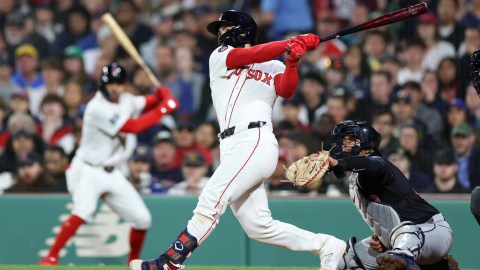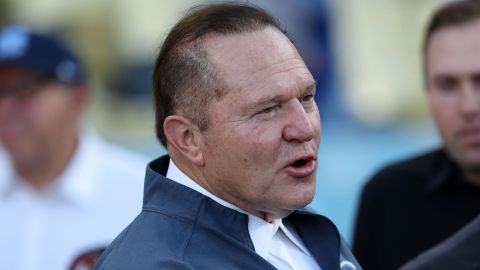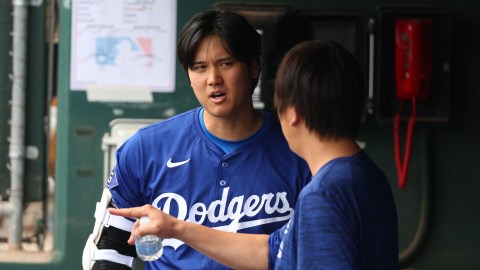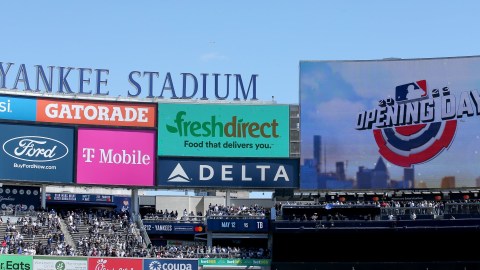 The presumption of innocence is a sacred principle within the United States judicial system. When it comes to baseball, though, it’s becoming harder and harder to jump on board with the whole “innocent until proven guilty” thing, even if we’d like to think the Steroid Era is yesterday’s news.
The presumption of innocence is a sacred principle within the United States judicial system. When it comes to baseball, though, it’s becoming harder and harder to jump on board with the whole “innocent until proven guilty” thing, even if we’d like to think the Steroid Era is yesterday’s news.
Alex Rodriguez and Gio Gonzalez — two players linked in a damning Miami New Times report to a PED-selling, anti-aging clinic — have already come out and denied any involvement in what is essentially an East Coast version of BALCO. But given baseball’s tainted past and still rehabilitating present, it’s inherently hard to believe any player when allegations such as those published on Tuesday arise.
Technically, Rodriguez, Gonzalez and the rest of those named in the Miami New Times report are innocent, despite what appears to be convincing evidence showing they were in some way, shape or form linked to the Biogenesis clinic that allegedly sold performance-enhancing drugs. In the court of public opinion, the allegations already have the players dead to rights, as a cloud will forever hang over their heads –whether deserved or not.
In the case of Rodriguez, the recent allegations further squash what had been a legacy already flattened by steroid use. The 14-time All-Star and three-time MVP has had some of the most impressive statistical seasons on record over the course of his big league career, but his 2009 steroid admission — during which the slugger claimed to have taken steroids between 2001 and 2003 — forever tainted his laundry list of accomplishments and cast serious doubt over whether he’ll ever gain enshrinement into Cooperstown. With that in mind, Tuesday’s article in the Miami New Times — which reports that records obtained from the clinic link Rodriguez to banned substances through last season — really just makes a fraudulent career appear that much more so.
The same can be said — although to a lesser extent because of their minimal star power — for Melky Cabrera, Yasmani Grandal and Bartolo Colon, all of whom have already been suspended in the past because of PED use. Tuesday’s report won’t add much fuel to those fires, and we’ll simply have to see what comes of the inclusion of Gonzalez and Rangers outfielder Nelson Cruz.
The biggest takeaway instead is that no matter how much we want to believe baseball is making strides when it comes to cracking down on the use of banned substances, and admittedly the testing process has improved, PEDs will likely always be a pandemic across the game. No matter what type of testing is in place, and no matter how often that testing occurs, there will always be those who look to cheat the system. And in many ways, it’s because certain players would be fools not to given the risks versus the rewards.
The biggest defense for players like Barry Bonds and Roger Clemens getting inducted into the Baseball Hall of Fame is that they were premium talents regardless of whether or not they ever used performance-enhancing drugs. Rodriguez, once a five-tool prospect, falls into that same category. But other fringe players that have come and gone have made a name for themselves, and in the process obtained significant financial gains, in large part because of a spike in production that coincided with the use of PEDs.
Cabrera, for example, was nabbed last season for PEDs, and while he ultimately received a contract this offseason that was of lesser value than it would have been had he gone the whole season without getting caught, the outfielder still managed to reel in a $16 million deal with the Blue Jays. For all we know, had Cabrera never opted for PEDs, he would have remained a middling outfielder on the cusp of falling out of Major League Baseball at any given moment. And so in that sense, it’s hard to fault the guy for rolling the dice and bending the rules in order to gain himself financial security, even if we’d all like to believe most players would opt for professionalism over materialistic gain.
The fallout of Tuesday’s Miami New Times report is perhaps just beginning. At this point, though, it’s more about what has stayed the same in the wake of the Steroid Era than what has changed. It’s rather discouraging to proceed with a “boys will be boys” mindset, but the fact that there will always be some risk-takers is the only thing that’s abundantly clear each time a new allegation surfaces.
The presumption of innocence should thus be replaced with an inherent skepticism — even if it’s not an ideal way to enjoy a great game.
Have a question for Ricky Doyle? Send it to him via Twitter at @TheRickyDoyle or send it here.




